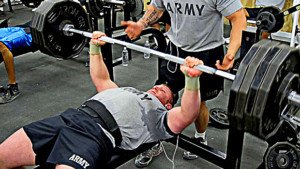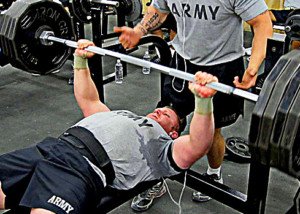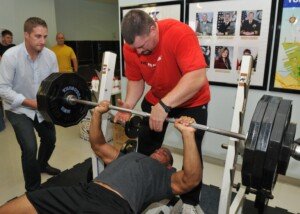
Why is it that the strongest bench pressers at the gym have big stomachs?
Does a big belly really improve one’s ability to bench press?
What did the last guy you saw bench pressing over 400 look like? It’s not unusual for someone who can bench press over 400 to have a king-size belly.
I’m a former personal trainer and was inspired to write this article after seeing a man at the gym bench 465. He was “big” overall—certainly a lot of it was muscle.
But he had a good thick layer of fat all over, too, including his stomach—a big blubbery gut that shook when he got off the bench.
Relationship Between a Big Stomach and Bench Pressing a Lot of Weight
You’re not imagining it if you’ve noticed that many big bench pressers have a big belly to match.
Imagine for a moment that you’re benching: one, two, three…and before you lower the barbell to begin the fourth rep, someone places a six-inch high cushion atop your chest.
You now get to lower the bar only part of the way, because the cushion is blocking you. That means less time spent lowering the bar.
Furthermore, the point from which you begin pressing it back up is closer to the top of the movement.
Wow, that was a lot easier than the first three reps, right?
Well, that’s exactly what’s going on when a man with a big gut bench presses a lot of weight.
He gets a shortened distance from the top of the movement to the bottom, because his stomach gets in the way.
It’s easier to move a lot of weight through 12 inches than through 20 inches of space.
A lifter with a small rib cage and an arm span that exceeds his height will struggle with the bench press, as this body type forces a long range of motion before the bar taps the chest.
The elbows are way below the bench (below shoulder level), arms quite bent, at this point, placing strain on the shoulder joints.
This is not a biomechanically efficient position from which to then push that bar all the way up to lockout.
A lifter with a big stomach, and especially a naturally big rib cage, will not need to bend the arms as much by the time the bar taps his chest. His elbows are nearly even with his shoulders.
If his arm span is a several inches shorter than his height, he has an extra advantage.
This second person’s full-range bench press is equivalent to what would be considered a “cheating” incomplete range of motion for the first lifter.
The big stomach, then, doesn’t literally make the person stronger. However, it puts the lifter in a biomechanically efficient position—by shortening the distance between lockout and chest-tapping.
Belly fat does not, in and of itself, increase muscle strength, but it can allow a greater amount of weight to be moved by shortening the distance of the movement.
The guy with the big gut who just benched 465 for three reps would have a real hard time if the fat in his belly was instantly sucked out.
He’d be having to keep lowering, and lowering, and lowering that bar till it touched his chest. Then he’d find it impossible to push it back up.


























